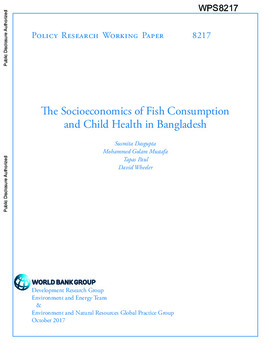The socioeconomics of fish consumption and child health in Bangladesh

Citation
Dasgupta, S. et al. (2017). The socioeconomics of fish consumption and child health in Bangladesh. Policy Research Working Paper; no. 8217. World Bank: Washington, DC.
Child malnutrition in Bangladesh exceeds WHOs threshold for public health emergencies. Using more than 36,000 records from several waves of the Bangladesh Demographic and Health Survey, the research focuses on the socioeconomic determinants of household consumption of all animal-source foods; the socioeconomic determinants of fish consumption, given its importance in the Bangladeshi diet; and the impact of observed consumption patterns on mortality and resistance to infectious diseases for children in their first years of life. Better maternal education and family economic status significantly increase the level of animal-source food intake, but they decrease the consumption share of fish. This suggests that increased income and education impart a "status bias" toward eggs and meat, even though they are more expensive and less beneficial than fish for child health. In addition, mothers individual preferences for different animal-source foods, and the seasonal availability of fish during the pre- and post-partum periods have large effects on child mortality and significant effects on resistance to several common childhood illnesses. These findings highlight the importance of programs to increase supply of fish, maternal nutrition education and more public health programs to promote fish consumption."
Permalink
Date Available
Type
Publisher
Countries
Research Themes
Topics